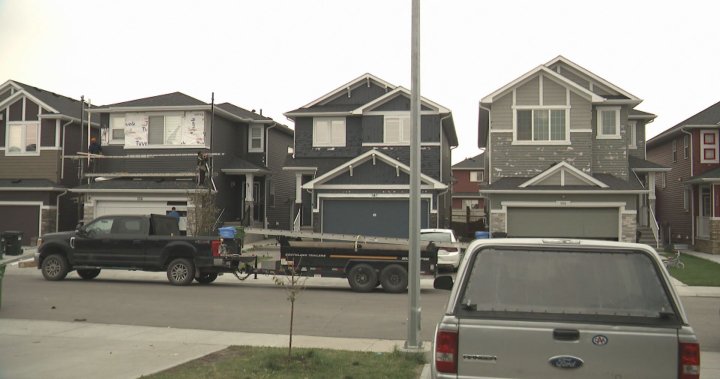A five-year program that helped thousands of Calgary homeowners upgrade to impact-resistant roofing has come to an end, leaving many residents concerned about future protection against the city’s increasingly severe hail storms.
Walking through the community of Saddleridge on a crisp autumn morning, I can still see the remnants of hail damage from years past. Tessa Mitchell, a longtime resident, points to her newly installed roof with a sense of relief.
“We got in just under the wire,” she tells me, adjusting her scarf against the wind. “Our application was approved last December. Without that $3,000 rebate, we might have put it off another year.”
The City of Calgary has officially closed its Resilient Roofing Rebate Program, which provided homeowners with financial support to install impact-resistant Class 4 roofing materials. Since its launch in 2021, the program delivered more than $16 million in rebates to approximately 5,300 Calgary households.
“This was about helping people protect their homes while building community resilience,” explains Ward 5 Councillor Raj Dhaliwal, whose northeast constituents were among the hardest hit by the devastating 2020 hailstorm. “That storm alone caused nearly $1.3 billion in insured damages, making it one of Canada’s costliest natural disasters.”
The program was created in response to that catastrophic June 2020 storm, which damaged more than 70,000 homes and vehicles. The Insurance Bureau of Canada confirmed it was the fourth-most expensive insured natural disaster in Canadian history at the time.
For many northeast Calgary residents, the program provided crucial financial relief. Class 4 impact-resistant roofing typically costs $4,000 to $8,000 more than standard materials, putting it out of reach for many homeowners without assistance.
Climate scientists at the University of Calgary have documented an increasing frequency of severe weather events across southern Alberta. Dr. Marina Hernandez, a climatologist studying extreme weather patterns, notes that Calgary sits in what meteorologists call “Hailstorm Alley.”
“The eastern slopes of the Rocky Mountains create unique atmospheric conditions that make this region particularly vulnerable to severe hail events,” Hernandez explains. “With climate change, we’re seeing more unstable atmospheric conditions that can lead to more frequent and intense storms.”
The program’s cancellation comes as part of broader budget constraints facing the city. Mayor Jyoti Gondek addressed the decision at a recent council meeting, noting that the program had accomplished its initial goals.
“We delivered significant support to thousands of Calgary homes, particularly in the northeast communities that were devastated in 2020,” Gondek stated. “While the rebate program is ending, we’re continuing to explore other ways to build climate resilience across our city.”
Some insurance companies offer premium discounts for homes with impact-resistant roofing, typically ranging from 5% to 25%, according to the Insurance Bureau of Canada. However, these discounts vary widely between providers and may not offset the higher installation costs.
For Ahmed Hassan, who moved to the Skyview Ranch neighborhood in 2021, the program’s end is disappointing news. Standing in his driveway, he gestures to the visible wear on his current roof.
“We were planning to apply this spring,” Hassan says. “Now we’re trying to figure out if we can afford the upgrade without the rebate. It’s not just about saving money on insurance—it’s about peace of mind during storm season.”
The city’s administration reports that the program helped accelerate the adoption of resilient roofing materials across Calgary. Before the 2020 hailstorm, less than 10% of new roofs installed in the city used Class 4 materials. That number now exceeds 40%, suggesting a lasting shift in building practices.
Ward 3 Councillor Jasmine Mian believes the program has created lasting awareness about resilient building practices. “While the rebate is ending, we’ve seen a cultural shift in how homeowners and contractors approach roofing choices,” she notes. “That education component may be as valuable as the financial incentives in the long run.”
The city continues to maintain educational resources about impact-resistant building materials on its website, including a contractor registry for companies specializing in resilient roofing installation.
For those who missed the rebate opportunity, the Alberta Insurance Council recommends homeowners consult with their insurance providers about potential premium discounts for resilient home upgrades, and to carefully document any improvements made to their properties.
As I leave Saddleridge, dark clouds gather on the horizon—a common sight in Calgary’s unpredictable climate. Mitchell glances upward before heading inside.
“At least now,” she says, “I don’t have to worry every time the sky turns gray.”






